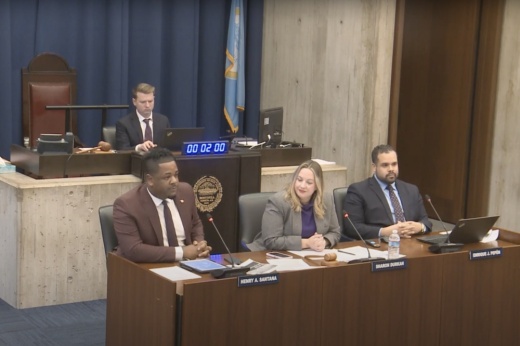The setup
Austin Mayor Pro Tem Leslie Pool, council members Zo Qadri and Chito Vela, and several council staff were invited to a Boston City Council planning hearing Dec. 3 to outline the series of development policy updates Austin leaders have recently overseen. Boston council members requested the hearing earlier this fall, saying they could learn from Austin's approach as both cities have faced affordability crises.
Boston council member Sharon Durkan said Austin's zoning updates should be explored, even if they won't be directly copied in the Northeast given the differences between both cities. She also credited Austin's "swift and impactful" response to boost local housing production and stabilize housing costs after years of record highs, noting it now has a relatively lower homebuying price-to-income ratio and share of rent-burdened households.
“A Boston that can get closer to these levels on these metrics to start will give our families and households a chance to breathe after years of suffocating housing cost burdens," she said.
In addition to the council hearing, Austin's delegation was also taken for transit and housing tours around Boston. That included a look at its Rose Kennedy Greenway atop I-93 that's been an inspiration for local planning for public amenity decks over I-35. Officials and staff from both cities were expected to meet further Dec. 4, including at a public panel also involving Cambridge, Massachusetts.
Zooming in
Austin representatives pointed to policies like the two-part Home Ownership for Middle-income Empowerment, or HOME, initiative as a key recent example of their council's approach to housing issues.
The controversial plan first proposed by Pool allows more residential units to be built on single-family property and for homes to be built on less land to begin with. HOME was pitched as a middle- and working-class homeownership strategy that could grant more flexibility to property owners who wish to add units on their land.
“Seeing young families struggle financially to put down roots made it clear to all of us that our housing market wasn’t working. The status quo was not working," Pool told Boston officials. "Why can a wealthy homeowner build a single 4,500-square-foot house, but a community-minded developer can’t build three 1,500-square-foot homes without the municipal equivalent of an act of Congress?”
HOME's first and second phases were approved in December 2023 and May 2024, and the policies have been used citywide since then. The first homes built under the new rules are just now hitting the market or nearing completion, while the policy's effects on trends like affordability, development patterns and displacement have yet to be determined.

Overall, Austin's representatives said they aimed to do something in the face of growth that strained the local housing supply and drove up costs. Alexis Garcia, policy adviser to Mayor Kirk Watson, said the current council focused both on land development code changes such as HOME and improvements to the city's permitting process linked to high local construction costs.
Vela said HOME, allowing taller apartment complexes near homes and neighborhoods, removing parking mandates for new construction, and encouraging mixed-use development with affordable housing in new places came after past attempts to revise land-use rules failed.
Vela cited the collapses of citywide zoning rewrites as a top reason council moved to pursue the types of individual reforms seen over the past few years instead. He also said the land development code ended up making largely wealthier, whiter areas of town "immune" from new development, which those changes were meant to address.
"There’s an inherent fairness in saying that everybody gets this type of housing, everybody gets these types of developments. It’s not going to be something that we’re just going to shove in one part of town," he told the Boston committee.
Leaders from both cities also touched on the approach to managing neighborhood desires amid growth.
Boston council member Enrique J. Pepén noted his constituents are proud of their neighborhoods' character and history, although localized rules and the city's dense land-use rulebook make new development harder. Boston officials also referenced their city's Squares+Streets zoning initiative to encourage mixed-use development with affordable housing and commercial in neighborhood centers linked to transit—a similar concept to Austin's Equitable Transit-Oriented Development, or ETOD planning tied to the future Project Connect rail and bus lines.
Qadri said he believes residents create neighborhood character, which can be lost if housing costs drive people away. And Vela stressed the need for citywide strategy as it was "impossible" to reach a consensus between neighborhood stakeholders across town. He also said those groups skew toward wealthier homeowners at the expense of working-class residents and renters.
What's next
Boston leaders highlighted Austin's slower or reversed rent growth, which Vela attributed to the surge in new construction in the city since the mid-2010s. And as Austin continues to see more land-use code updates, officials are also hoping to track more positive affordability trends.Vela noted that many projects under new rules are just now opening or still in development, meaning further effects from the recent changes could be coming.
“We anticipate that—and I think a lot of the large apartment developers also anticipate—that rents will continue to, at the very least, stabilize or potentially soften a bit more. So hoping to provide rent relief to a lot of folks in Austin over the next couple of years with these policy changes," he said.





